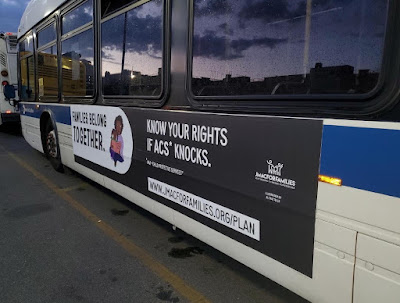● We begin with a photo: Check out the ads on New York City buses, from JMac For Families:
● J. Khadijah Abdurahman, who is both a parent with lived experience dealing with New York City’s family policing agency, the Administration for Children’s Services – and a Tech Research Fellow at the UCLA Center for Critical Internet Inquiry. I have a blog post about her powerful story in Logic Magazine. She describes her own experience of retaliation after she complained about one of the private foster care agencies with which ACS contracts, offers an overview of how “predictive analytics” makes things worse, and makes clear we need to dig deeper into how ACS is using it.
● Abdurahman also moderated this international conference
panel, Abolishing the Child Welfare System (and its Algorithms!) with
panelists Prof. Dorothy Roberts and Benjamin Lundberg Torres Sánchez
● And while we’re on the topic of algorithms run amok, there’s this, from The New York Times.
● The Imprint reports on a United Nations committee in Geneva that heard testimony about the racism that permeates the American child welfare system and asked tough questions of U.S. government representatives – all of which they evaded.
● The American Bar Association – a group that is about as “establishment” as one can get, came remarkably close to calling on Congress to repeal the three worst federal laws dealing with family policing. I have a blog post about it.
● When we think of the confusion of poverty with neglect (and it’s taken decades to get the family policing establishment to think about it at all) we tend to think of the obvious: A family is living in unsafe housing but instead of fixing the housing the family police take the children. But there are a whole series of more subtle ways in which neighborhood conditions related to poverty lead to needless removal of children. Nora McCarthy, co-founder of the New York City Family Policy Project, discusses this – and what can be done about it – in this column for The Imprint.
● And - yet again - a study shows that cash assistance for poor people - in this case the federal Child Tax Credit and Earned Income Tax Credit - almost immediately reduces what family policing agencies call child abuse and neglect.
● In Florida, is it a case of “here comes the new ‘lead agency’ just like the old ‘lead agency’”? In the Tampa Bay area, people are worried this is the case. But it doesn’t have to be. NCCPR explains what needs to be done in this story from WFLA-TV.
● In Houston, a desperate mother with nowhere to turn when her 14-year-old started running away and causing trouble at school sought help from the Texas family policing agency. Naturally, instead of help, they took away the child – and because Texas does that so often they have no place to put the children, they parked the child in a hotel. When the child told a family police worker she was hungry, the worker told her to become a prostitute. The worker was fired, but rest assured the swift response from the family police in Texas didn’t stop there: As KRIV-TV reports, they retaliated against the family for complaining.
● Sometimes family policing agencies can be as imaginative as they are greedy. You’ve probably heard about how they swipe foster children’s Social Security benefits and use the money to keep the foster care-industrial complex running smoothly. But as Ian Marx, the son of a veteran points out, they also snatch veteran’s benefits. He writes:
The financial security my mother meant to be my legacy after her proud service slipped right by me and into the hands of my new legal parent — the foster care agency — who was ultimately more concerned about its bottom line than my best interests.
Marx points out that the federal Administration for Children and Families can stop this practice through regulation. And if they won’t, Marx writes, Congress should.
